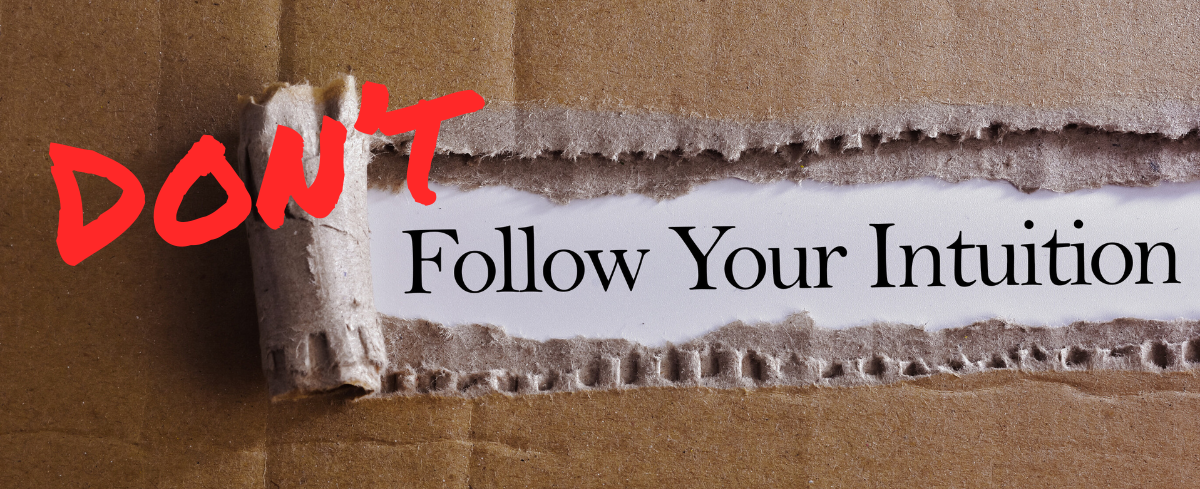Intuition – helpful or distracting?
When to trust your gut, and when to slow down and think.
Summary: Intuition can be a valuable guide, but it is not always reliable. It can help us sense misalignment, spot opportunities, and make bold personal choices. But it can also mislead when shaped by bias, fear, or lack of experience. This article outlines when to question your intuition and when to trust it, and offers five practical considerations to help you make stronger decisions by using both, head and gut.
A client recently told me he was about to make a big career move. He was leaving a stable role in a well-established organisation and considering a leap into the unknown with a younger startup. “I’m going to go for it,” he said. “My gut tells me I’ll regret it if I don’t give this a shot.”
We all know that feeling. That inner nudge that whispers (or sometimes shouts) when something is right or wrong. Our intuition can cut through the noise in a way no spreadsheet or risk analysis can. It can sense when something is “off,” or point us towards what we really want, even when logic is arguing the opposite.
But is it always right???
I remember vividly the end of my first secondment to London. I had always said I’d stay for three years. So when the three years were up, the plan was clear: return to Germany, take a bigger job, accept the promotion. On paper, it was everything I should have wanted. Yet I can still see myself walking through a festive London on one of my final days, close to tears. My gut knew I didn’t want to leave. Deep down, it probably knew from the beginning. But my head had already made the call. So back I went. Unsurprisingly, I didn't last very long. Within two years I was back in London - this time for good.
That experience taught me something important: ignore your gut at your own peril. It isn’t always loud or rational, but it is often honest.
Still, here’s the real question: is following your intuition always wise?
The truth is, it depends. Intuition is data – valuable data – but it’s only one piece of the puzzle. Sometimes it leads us closer to what we really want. Other times it can be clouded by fear, bias, or inexperience. The skill lies in knowing when to listen and when to pause.
When to trust your gut
Assessing opportunities: When a new role, project, or partnership looks good on paper but something in you resists, your gut may be signalling hidden downsides.
Making personal career choices: Logic can map out the pros and cons, but your gut often reveals what you will actually enjoy, commit to, and sustain over time.
Navigating political undercurrents: In a high-stakes meeting, sensing when to hold back or speak up can be the difference between gaining allies or making enemies.
Sensing cultural alignment: Sometimes everything looks right on paper, yet something in the interaction feels off. Your gut can help flag when values, ways of working, or underlying expectations don’t fit – without slipping into bias or stereotypes.
Creative problem-solving: Breakthrough ideas often come from intuition connecting patterns faster than rational analysis can.
When to question your intuition
Hiring and promotion decisions: Intuition can be heavily skewed by similarity bias, stereotypes, or “likeability.” Rely on structured criteria instead.
Interpreting silence: Assuming someone’s quietness means disinterest or incompetence risks misjudging cultural or personality differences.
Reacting under stress: Intuition in high-pressure moments often mirrors fear, not clarity. Decisions made in panic can backfire.
Assessing risk in new ventures: Gut feel tends to underestimate complexity and overestimate control. Data and scenario planning give a clearer picture.
Judging performance too quickly: First impressions about a colleague’s capability may be shaped by presentation style rather than actual substance.
When in doubt, ask yourself these five questions
Am I reacting to facts or to familiarity, comfort, or fear? Make sure you separate instinct from an emotional reflex. If fear or habit is driving you, logic may be the better guide.
Have I checked whether bias (similarity, stereotypes, overconfidence) is colouring my instinct? Always examine whether your “gut” is actually prejudice in disguise. If bias is likely, rely on structured reasoning.
Do I have enough experience in this specific context for my intuition to be reliable? Experience builds pattern recognition. If the situation is new, intuition is less dependable, so analysis should take the lead.
What would I advise a colleague to do if they faced this same choice? Creating distance helps you see past your own blind spots. If your advice to them differs from your instinct, it’s worth questioning that instinct.
If I delayed the decision until tomorrow, would my gut and brain still be in conflict? Time can bring clarity. If reflection eases the tension, analysis should carry more weight. If intuition stays strong, it may be signalling something important.
The takeaway: intuition isn’t magic. But it also isn’t just noise. It’s another form of information, shaped by experience and emotion. At its best, it helps us catch what logic misses. At its worst, it pulls us off track if we confuse fear or bias with truth.
Don't choose between your gut and your head. Use both! Listen to both, test one against the other, and make the call with greater confidence.
SIGNATURE
October 2025
Leap Sheets - How to know if you trust your gut
Have you checked out our LeapSheet library yet? These handy one-pagers are designed to help you reflect, reframe, and take action on everyday leadership and career challenges. They’re quick to read, easy to save, and full of practical prompts to help you take action.
Sign up for free to access the full (and growing) library.
If you’ve enjoyed this article and don’t want to miss future reflections and resources then do sign up for monthly newsletter.




